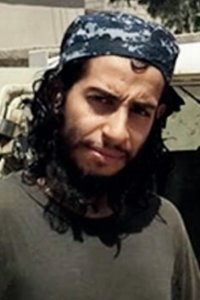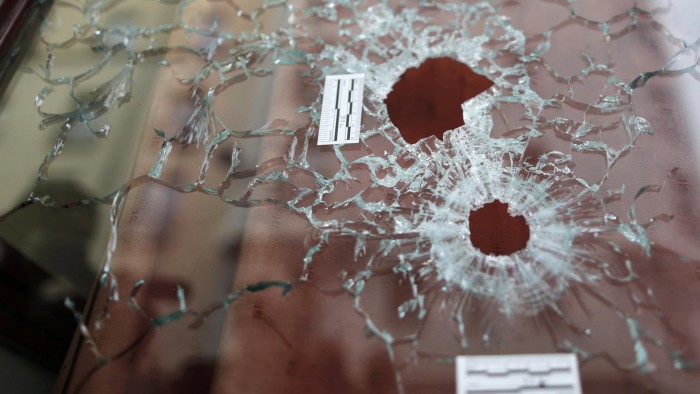Paris attacks: Hollande says France is at ‘war’ with Isis
Roula Khalaf, Editor of the FT, selects her favourite stories in this weekly newsletter.
France’s President François Hollande demanded sweeping new powers for the French state to take on Isis in the wake of Friday’s chilling co-ordinated attacks on Paris as he pledged all-out war against the terrorist group.
Addressing a rare joint session of both houses of parliament, Mr Hollande called for the state of emergency to be extended to three months and for new authority to strip French citizenship from people involved in terrorism.
Key developments
- French jets have launched strikes on the Isis stronghold of Raqqa, Syria
- French police are looking for a suspect named as Salah Abdeslam, a French national still on the loose. Investigators also suspect Abdelhamid Abaaoud, a Belgian national, of helping plan the attack
- Police carried out 168 raids overnight across France, while investigations also continue in Belgium
- There was a minute’s silence across Europe on Monday at 11am GMT
- President François Hollande has demanded sweeping new powers for the French state to take on Isis — including constitutional changes
“These acts of war have been decided and planned in Syria,” he said. “They have been organised in Belgium and perpetrated on our soil with French accomplices.”
France would battle Isis “without a respite, without a truce . . . It is not a question of containing but of destroying this organisation”, he added as the investigation continued into the shootings and suicide bombings that killed at least 129 people on Friday night.
Mr Hollande called for an emergency meeting of the UN Security Council, adding he would meet presidents Barack Obama of the US and Vladimir Putin of Russia soon in his bid to form a “big unified coalition” against Isis.
But Mr Obama ruled out a large-scale deployment of troops, sounding a note of caution that referred to US failures in Iraq. He said such an offensive would be a mistake “not because our military could not march into Mosul or Raqqa or Ramadi . . . but because we would see a repetition of what we’ve seen before”.
Mr Hollande said France would seek agreement on a European plan for sharing airline passenger data and called for “co-ordinated and systemic checks’’ at the borders of Europe’s Schengen free movement area.
The hunt in France and Belgium is largely focusing on Salah Abdeslam, whose brother Ibrahim has been named as the suicide bomber on Boulevard Voltaire. Mr Abdeslam was in a car that was stopped and checked but ultimately permitted to pass through the border into Belgium on Saturday morning.
A third brother, Mohamed Abdeslam, told reporters on Monday that his family “knew nothing and had been affected by the events. Just like everyone else we found out by watching television and never for once thought that my brothers would be involved in these attacks.”
French officials have also signalled they suspect the involvement in planning the attacks of Abdelhamid Abaaoud, a Belgian linked to attempts this year on a high-speed train to Paris and a church in the city’s suburbs.
Mr Hollande and many others observed a minute of silence on Monday to honour the victims of the atrocity, as Manuel Valls, France’s prime minister, warned of further terrorist attempts in France and elsewhere in Europe.
“Terrorism has struck and can strike again, these days, in the coming weeks,” Mr Valls warned. “It is a clash of values; it is a clash of civilisations.”

In a sign of the far-right response to the attacks, Marine Le Pen, leader of France’s National Front, called on the country to close its borders to immigrants immediately.
“Our fears and our warnings on the possible presence of jihadis among the migrants have unfortunately now been turned into tangible reality by these bloody attacks,” she said.
Seven suspects died in the attacks — six set off their explosives and one was shot by the police.
Samy Amimour, who was named as one of the attackers at the Bataclan concert venue, violated travel restrictions placed on him in 2013 and had been subject to an international arrest warrant at the time, according to the prosecutor’s office.
The other newly identified suicide bomber, a Syrian national, took part in an attack at the Stade de France. A Syrian passport in the name of Ahmad Al Mohammad found at the scene of the attack was located near his body. But François Molins, the Paris public prosecutor, said the authenticity of the passport “had yet to be verified”.
More comment on FT.com

The treacherous path to defeating Isis
As assault on French capital shows Isis opening a bloody new front, impetus could build for Syria deal
Time for engagement, not fearful retreat
Solidarity and thoughtful action are the only means to defeat terrorism
A proclamation against Isis, the party of death
Our citizens need an inspiring statement of just what it is we must defend
The other attackers included Omar Ismael Mostefai, a 29-year-old French citizen of Algerian origin, who died after attacking the Bataclan, and Bilal Hadfi, 20, who is reported to have blown himself up at the Stade de France but whose identity has not yet formally been confirmed by the prosecutors.
Two further bombers have yet to be identified.
Mr Valls said that since this summer, French intelligence services had prevented five other attempts. He suggested that the state of emergency, which gives sweeping new investigative powers to police forces, could be extended beyond 12 days — a move that would require approval by parliament.
“We know that more attacks are being prepared, not just against France but also against other European countries,” he said.
David Cameron, Britain’s prime minister, told the BBC that the UK security and intelligence services had stopped seven smaller-scale terrorist attempts over the past six months.
The French defence ministry said on Monday that 12 aircraft had taken part in raids on an Isis command centre, munitions depot and training camp in Raqqa, the Islamist group’s stronghold in Syria. The strikes were launched in co-ordination with US forces.
In depth

A state of emergency has been declared in France after a series of co-ordinated terrorist attacks in the capital. The government has responded with a series of police raids and stepped up air strikes against Isis in Syria
Further reading
Local sources — including the activist organisation Raqqa is Being Slaughtered Silently — said seven locations were hit by the strikes but did not report civilian casualties, adding that the bombed locations were all used by Isis. Nevertheless, residents expressed fear that the strikes would hit civilians more than Isis itself.
John Brennan, director of the Central Intelligence Agency, described the attacks as a “wake-up” call about the technical and legal restrictions that intelligence services face in collecting information.
He said on Monday that terrorist groups such as Isis had achieved a significant increase in “operational security” through the use of new technologies that can hide their identity and had “gone to school” on the methods that intelligence agencies use to track them.
Mr Brennan added that Isis had been plotting the Paris attacks for “a number of months” and was likely to be planning other such operations.
“I am sorry to say that this is something we are going to have to deal with for quite some time,” he said.
Comments